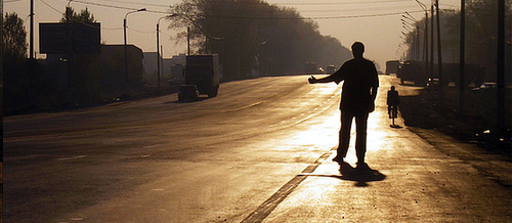Two of my friends are about to do a sponsored hitch-hike, raising money for a charity supporting research against cancer (you can sponsor them!). A hitch-hiking journey is, in many ways, similar to a faith journey:

Photo: Petr Ivanov, re-used under CC License
1. When you’re hitch-hiking, you’re basically surrendering your journey to strangers. In most cases, you know the ultimate destination and know you’re going to get there (although that’s not the case for my friends), but have no idea what detours you might take, or how long it will take you. Much the same is true for your journey of faith: you can look to the final destination, but how it will come about is very much a mystery.
2. There is one major reference book to help you hitch-hiking. And in large friendly letters, that book has, on its cover: “Don’t Panic.”
3. Sometimes, you get stuck. For ages. And that’s discomforting, discouraging, and you can’t look beyond the present stage. But there will usually be a car that comes along. Patience is a great virtue, and one that is necessary in a journey of faith.
4. You need others. Without cars driving along the motorways, any hitch-hiking attempt would be doomed to failure. Crucially, then: you need people who are essentially different from you. Motorists are far more helpful than other hitch-hikers to go from A to B. People with experience and the theological know-how can get you quite a way down the road.
5. You need friends. People like you. Their advice as people who have hitch-hiked in the past is extremely valuable: laminate some card so you can change the destination/direction. Avoid roundabouts. Try service stations along the motorway. Travel in pairs – for your own safety. But the only people you will understand are people whom you know to have been in similar situations as you. Surrounding yourself with wiser people, or simply reading Hooker, Calvin, Augustine or Piper – useful though it may be, will not usually provide you with information you can relate to. It is not sufficient.
6. Some places are better to get lifts than others. But these places are not necessarily the most sheltered ones. When I was hitch-hiking in Wales, it was so windy that an elderly couple took us in – they wouldn’t usually pick up hitch-hikers, but they took pity on us while we were standing in the rain. It is a useful skill to have to be able to work out where those spots are, and to seek them out. They’re not the same for everyone, and they change according to circumstances, so it’s not easy – but it is the one way to move forward.
7. Sometimes, you just have to walk. When I hitch-hiked to Ireland, we got stuck in a little town with barely any cars passing by (that’s the Welsh border for you), so we had to walk for quite a while to keep progressing. You can’t always expect to have a spiritual IV – there will be times when you will have to feed yourself. For those times, it is good to have a personal discipline of prayer, Bible reading, etc.
8. It is likely to look weird to the outsider. When we got stuck in that little town, a local reporter decided our appearance was weird enough to warrant interviewing us. I don’t think we made it to that local paper – but the fact remains that we looked out of the ordinary. The same should be the case for all Christians: not because standing out is good in itself, but because it is a by-product of our innermost identity, which is different from what people are used to.
9. You don’t get to choose the ride. A Mercedes going at 120mph, a minivan with no seats in the back, a lorry, or a friendly couple in an affordable car – I’ve experienced all of them. Of course, you can (and should, sometimes!) always ask to be dropped off, but you cannot demand to hitch-hike in a Jaguar. No church will be perfect, and trying to find exactly the church you’re used to, or looking for, is simply going to leave you stranded.
10. While you can get prepared before you start hitch-hiking (signs, phone chargers, etc.), all you really need is your thumb and willingness. The same goes for embarking on a journey of faith: you can put it off for ages, just getting ready or trying to; but you can always jump in.
11. Tea will get you through the day. And it needs to be shared: motorists and hitch-hikers alike need it. Advice to hitch-hikers: bring a flask.



